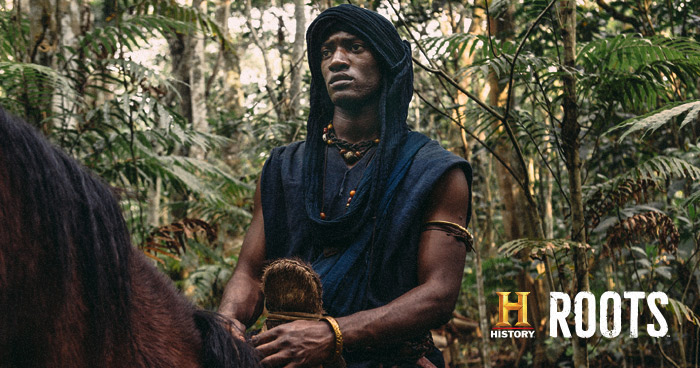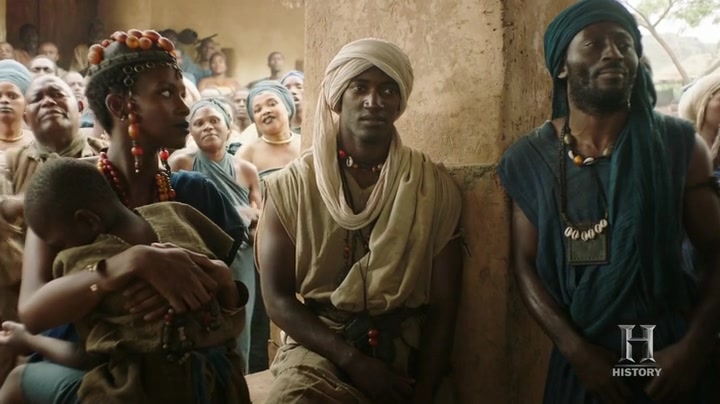NOTE: This review contains MILD SPOILERS for the TV miniseries based on Alex Haley’s book, Roots: The Story of an American Family.
Introduction

What would you like young audiences, esp. young black men, to get from this story? -Sunny Hostin (CNN)
That your history did not begin with slavery. -Malachi Kirby, actor
You may be asking- WHY do we need a retelling of this story? MANY in the US (and worldwide) already read the book and watched the 1977 series. But once you start watching, you realize how important it is that Roots reaches a new generation of viewers. Faith (NOT necessarily religion), family (incl. marriage- “jumping the broom”), and traditions (from Africa) become even MORE important under slavery.
Mark Wolper, son of David Wolper (who developed the 1977 miniseries) decided on the remake after his kids couldn’t sit still to watch it. The main issue- it was TOO slow! NOT only does this show have more action, it’s much more colorful, richly detailed (thanks to technology and knowledge filmmakers didn’t have 40 yrs. ago), and very watchable (thanks to veteran and newcomer actors, as well as skilled directors). I was esp. happy to see that LeVar Burton (who played the original Kunta Kinte when he was only 19 y.o.) was an executive producer on the series; he also has a brief cameo in Part 1. The music is one of the BEST elements, thanks to Ahmir “Questlove” Johnson, a member of The Roots.
Part 1

This is (undoubtedly) the strongest 2 hrs. of the 8 hr. series! Time is given for us to know re: the West African city of Jufuree (which was NOT a little village, BUT had a pop. of nearly 10,000). The sets are quite intricate and large-scale. There is the gorgeous turquoise dyed cloth that is worn by many people. Women use dark color on BOTH their lips and around their eyes. Tribal practices are blended w/ the religion of Islam (a fact which was jarring to SOME viewers, from reviews I read). Yes, people do use the term “Allah” and prostrate themselves to pray! About 30% of the African slaves brought to “the New World” were Muslims.

Kunta Kinte (British newcomer Malachi Kirby in a standout role), the son of Binte Kinte and Omoro Kinte, is a bright, observant teenager who is training to be a warrior (w/ his male peers). He also has a crush on a local girl, and she seems to like him, too. But his parents say that they’ll arrange a marriage for him (when the time comes). Kunta has great respect for his parents, tradition, religion, yet he ALSO possesses a strong will (which will BOTH help and hurt him later in life). We will see things more from his eyes in MANY cases (thanks to camera-work). If great acting is in the eyes, then Kirby is definitely one to watch in the future.
The next segment of the story which impressed me was The Middle Passage; a huge ship was built to accommodate actors, cameras, and crew! If you saw 12 Years a Slave, then you can handle this part (maybe a BIT better than more sensitive viewers). We get a glimpse of JUST how cramped, crowded, and downright horrific conditions were for the men (and some boys)!
A slave is not bought; a slave has to be created! -The overseer explains to Kunta
When we get to America, it’s Revolutionary War era, and Kunta is purchased by a surly/middle-aged planter from Virginia, John Waller (British actor James Purefoy). He has a British wife, Elizabeth, who has settled easily into the life under slavery, though their marriage doesn’t look happy. His more sensitive and younger brother, Dr. William Waller (British actor Matthew Goode), lives in a neighboring plantation and is also the local physician. But the worst of this lot is the red-headed (and bearded) Irish overseer who REALLY enjoys his work!

Kunta (who is named Toby by Elizabeth) DOES find an (at first hesitant) ally in Fiddler (American veteran actor Forrest Whitaker), who has special role in the Waller household (thanks to his musical talent) and is a favorite slave of the mistress. Whitaker does a GREAT job in his role (as you’d expect); he also gets some of the BEST lines in the entire series! In one esp. poignant scene, Fiddler stops in his tracks, recognizing a lullaby that Kunta sings. He swears that HIS grandmother sang that song, too.
Belle is a female slave who feels sympathy for Kunta. She convinces Dr. Waller to get Kunta to care for his horses and drive him around to patients. Belle looks after him when he’s near death, and they grow to love each other (over the span of 10 yrs.) Belle (though still youthful) has a painful past, BUT decides to marry Kunta and start a new life. They have a daughter, who Kunta names “Kizzie.” Now he is firmly rooted in America, yet still VERY much an African in his heart and mind.
Part 2
Never let them take your mind. -Kunta tells his daughter
Kizzie becomes a companion to the Waller’s daughter, who insists on teaching her to read. BUT (of course) this is the SAME reason that she is sold “down the river” when she reaches adolescence. Kizzie ends ups at a small farm in South Carolina owned by an alcoholic, violent gambler- Tom Lea (British actor Jonathan Rhys Myers). The first time, Kizzie fights w/ ALL her strength to stop her new master, BUT to no avail. In time, she has a son, who Tom names “George” (after his father). Kizzie, who gathers up the strength of Kunta, Belle, and her ancestors, decides that she’ll endure for her son to have a better life.
Part 3

In some odd way, Tom seeks to be closer to his (unclaimed) young son, which causes Kizzie (American theater/TV actress Anika Noni Rose) great pain. Tom announces that the older slave, Mingo (who handles the cocks and goes to fights w/ him), will teach George. It turns out that Chicken George (as he is called) has a natural gift w/ these animals!

Chicken George (British newcomer Rege-Jean Page) grows up and falls in love w/ Matilda, a slave from a neighboring plantation. Her father is a no-nonsense minister (on his day off), while Kizzie doesn’t believe in the Christian god. Chicken George keeps making money for Tom, gets respect for his talent/hard work from the local cockfighters (of all colors), and eventually marries Matilda.
You have no honor, Tom Lea! -Chicken George shouts to his master/father
In time, the gentlemen planters even warm to the Leas, though they are from low birth and Tom is of Irish heritage. Kizzie fears that things can go wrong at ANY moment, b/c of Tom’s volatile temper. There is an explosive scene between Chicken George and Tom, where we realize how low a master can go (even when the matter at hand is his OWN blood). BOTH Page and Rhys Meyers shine in this scene; however, these men are eclipsed by Rose, who is a standout in this series.
Part 4
There’s no wrong way to be a slave. -Chicken George explains to his son, Tom
This is the weakest of the episodes, BUT does have some good moments. We see Chicken George join up w/ one of the “African” regiments of the Union army. One of his son’s, Tom, becomes a skilled blacksmith. Like his father, he earns money for his master, and raises a family w/ his part-Cherokee wife.

Tom straddles that conflicting (yet exhilarating) time between slavery and Emancipation, working hard to keep his anger and resentment in check. The descendants of Kunta Kinte grow in number and take their place as free black Americans. There is a LOT more (which I haven’t discussed above)- check this show out for yourself!









